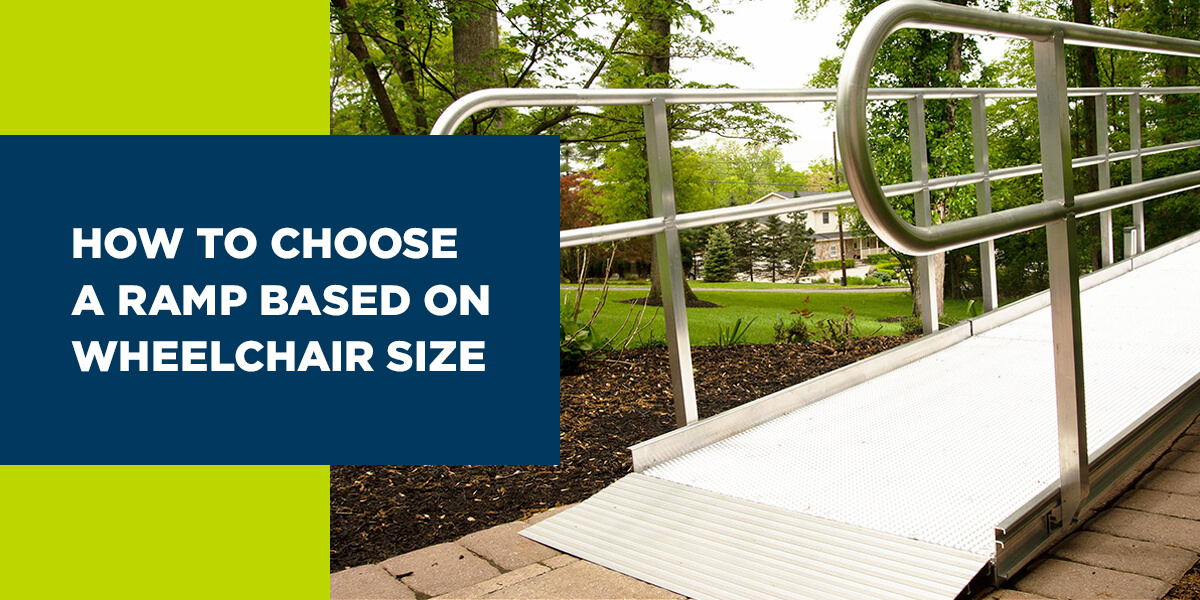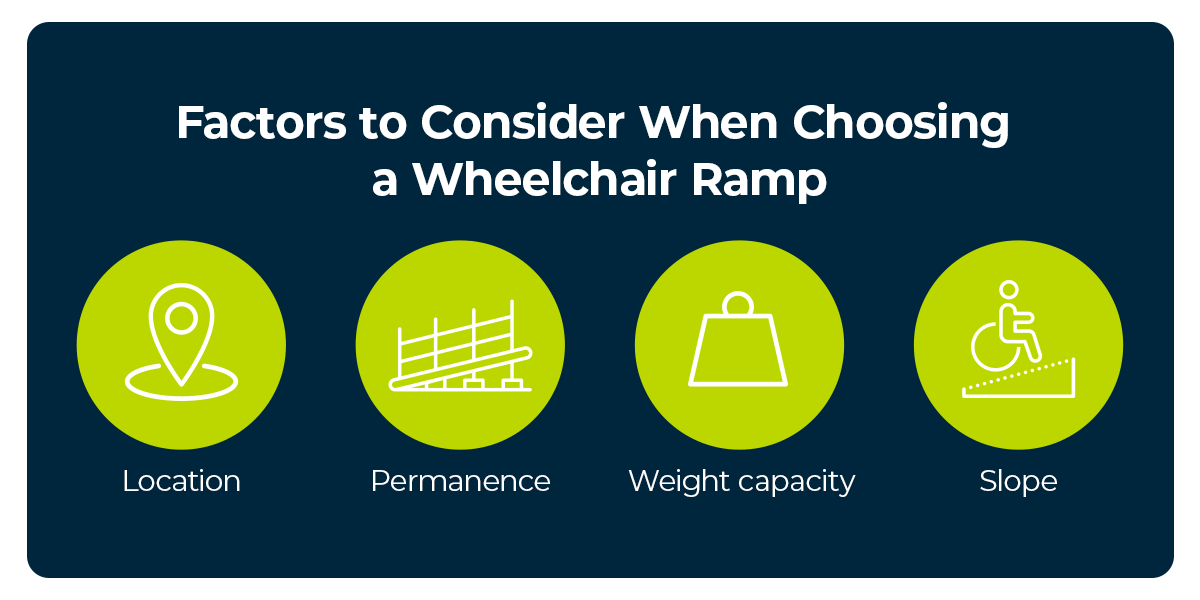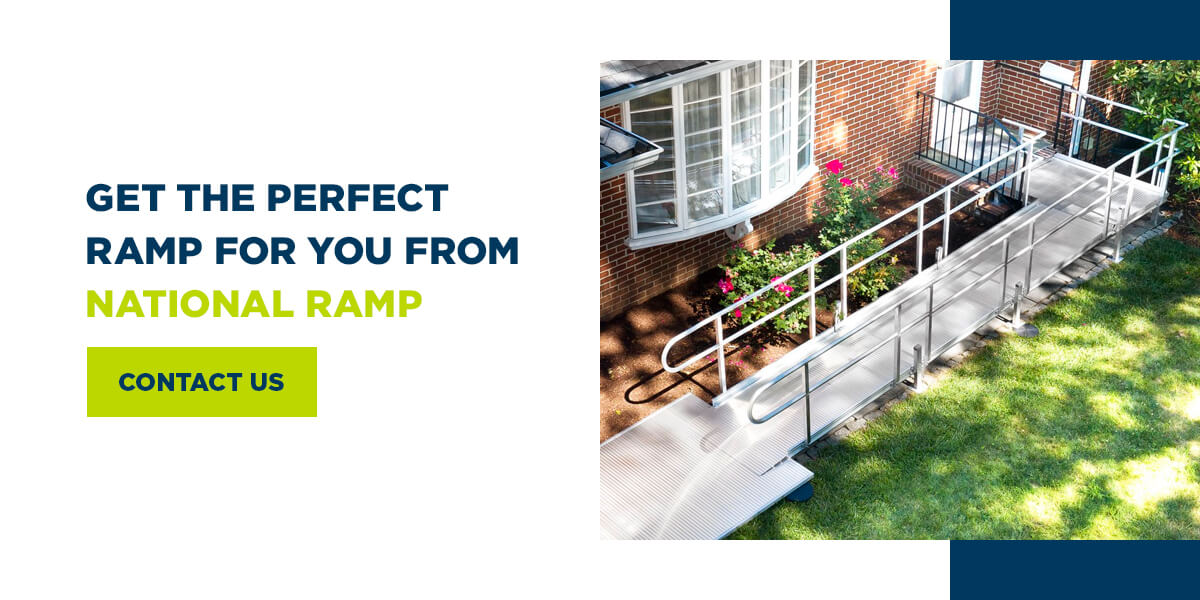
When you, a loved one, or someone in your care needs a mobility device, you’ll likely need to modify your or their home to be more comfortable and accessible. One vital modification is a wheelchair ramp. Today, there are many types of ramps available to fit different needs, and aluminum ramps are widely considered the most cost-effective, durable and low-maintenance option. While the many types of ramps give you more options, deciding which is best for you or your loved one can be challenging.
Luckily, a few different factors can help narrow your options. One of the best ways to choose a wheelchair ramp is by considering the size of your mobility device.
A Quick Summary of This Article
Knowing the measurements and weight of your mobility device and measuring the height of your stairs or rise is key to choosing a ramp. While ramp size may vary, aluminum is the smartest material choice, owing to its safety, versatility, cost-effectiveness, durability and low maintenance requirements.
- What Size Wheelchair Ramp Do You Need?
- How to Measure for a Ramp
- Factors to Consider When Choosing a Wheelchair Ramp
- Wheelchair Ramp Types
- Ramp Materials
- Ramp Accessories for Increased Confidence and Safety
- Get the Perfect Ramp for You From National Ramp
What Size Wheelchair Ramp Do You Need?
The Americans with Disabilities Act (ADA) has specific requirements regarding the dimensions of a wheelchair ramp. These specifications ensure that the ramps are safe. According to the ADA ramp requirements, a ramp must be one foot long for every inch of rise or step height. Additionally, the ramps must be at least 36 inches wide between handrails.
However, depending on your needs, you may wish for your ramp to be longer or wider. For instance, you want the ramp to be wide enough to accommodate your mobility device and have space on each side, but you may also want the ramp to be wide enough for two people to walk next to each other.
How to Measure for a Ramp
Regarding the dimensions of a wheelchair ramp, the ADA dictates ramps must have 1 foot of ramp per 1 inch of step height or rise. However, the slope requirements differ if you use a walker or similar mobility device. The ADA states ramps must have a 1:12 maximum pitch, meaning there should be 12 inches of ramp for every inch of elevation. Thus, the slope determines how long a wheelchair ramp should be in each respective location.
To make things easier, you can use a slope calculator to determine what slope is necessary for your ramp. If you’re unsure and want experts’ help, schedule a free consultation with no obligations from our specialist ramp consultants. We’re experienced in determining what size and type of ramp will optimize space and ease of use.
Gather Specific Information About Your Mobility Device
Remember to ensure you have the correct measurements and information about your mobility device when determining your required ramp size. The ramp needs to accommodate the size and weight of your wheelchair or scooter, as well as yourself and possibly another person pushing your chair if you need assistance.
The weight capacity should include your weight, a weight estimate for a carer or family member, and your mobility device’s weight. Many manufacturers of scooters and automated and manual wheelchairs include maximum incline information that will be helpful when figuring out how to choose a ramp based on your wheelchair size and weight.
Factors to Consider When Choosing a Wheelchair Ramp
There are many factors you should consider when choosing a wheelchair ramp, including:

- Location: There are various ramps for numerous locations. For example, threshold ramps are excellent for doorways, folding ramps are used for steps and raised landings, and solid ramps are long, making entering and exiting your home easier.
- Permanence: Ramps can be permanent and anchored to the ground, but they can also be semi-permanent or modular. Modular ramps are customizable, and professionals can remove them more easily, while semi-permanent ramps rest on the ground and are easy to move. Modular and semi-permanent ramps benefit people who won’t use their mobility device for very long or plan to move from their current residence. Permanent ramps are for people who need them for a long time and are ideally constructed from aluminum.
- Weight capacity: Wheelchair ramps can be standard or bariatric. Most standard ramps support up to 1,000 pounds, but this can vary based on the type of ramp. Consider the weight of your mobility device and additional medical or other assistive equipment to determine what weight capacity your ramp needs to be. Generally, power wheelchair and scooter users require bariatric ramps.
- Slope: The slope you need can vary based on your mobility device, the ramp length and the rise. Generally, if you ride in a wheelchair or scooter, you need to follow the ADA guidelines.
Wheelchair Ramp Types
Here are some of the most common types of wheelchair ramps and the different mobility devices they can accommodate:
- Solid: Solid ramps have a handrail system and high weight capacity and provide a large wheelchair ramp for your home. You can customize the length and style of aluminum solid ramps. They are an excellent choice for regular-sized wheelchairs or scooter users.
- Folding: Folding ramps are ideal for locations with two steps or a rise of 15 inches. These ramps can be 2 to 6 feet long and are great for small wheelchairs and walkers.
- Threshold: Threshold ramps provide convenient and safe transitions at thresholds. They consist of aluminum and ½ an inch to 6 inches tall and work for 15-inch rises or two steps. The maximum weight capacity is 1,000 pounds. Threshold ramps are more narrow than other ramps because they fit the size of the threshold. You can use a wheelchair, walker, scooter or stroller with a threshold ramp. However, there probably won’t be enough space for someone to walk beside the mobility device.
- Bariatric: This permanent wheelchair ramp for bariatric patients has a high weight capacity and generous width. It can accommodate up to 1,200 pounds and is 48 inches wide. Therefore, it’s an excellent choice for heavy, wide wheelchairs and scooters.
- Scooter: Scooter ramps are for scooter and power wheelchair users. They can accommodate the weight and width of scooters and keep them steady on a slope of 20 degrees or less. The nonslip, high-traction surface can help you stay mobile in any weather, and the handrails provide extra support when entering or exiting your home. Our scooter ramps are adaptable for front doors, side doors and garages, and we have folding ramps that help you navigate curbs so you can move freely in public spaces.
- Switchback: These ramps alternate at 180-degree turns to help you navigate higher or elevated spaces. Switchback ramps are excellent if you need resting platforms before navigating slopes. They work well with standard wheelchairs, walkers and rollators and perform best when made from aluminum.
Ramp Materials
Once you know what type of wheelchair ramp you want, you need to consider the material. Ramps consist of many materials, including:
- Aluminum: Aluminum ramps are solid, durable and have the highest weight capacity. They naturally resist corrosion, making them an excellent choice for areas with frequent rainfall. There are different types of aluminum ramps to suit your needs.
- Wood: Wooden deck ramps are permanent and can be aesthetically appealing but require regular and intensive maintenance.
- Steel: Steel ramps are heavier than aluminum ramps, making them more difficult to install and less versatile.
After over three decades in the industry, National Ramp has seen time and again that aluminum outperforms other materials and offers a cost-effective solution with numerous benefits.
Ramp Accessories for Increased Confidence and Safety
Add ramp safety accessories to give yourself, a loved one or someone in your care extra support and safety while using a ramp. Our innovative ramp accessories can be added to your current ramp or a new installation and include:
- Ramp support footer pads
- Anti-slip stair treads
- Anti-slip mats
- Glow-in-the-dark ramp tape
- Anti-slip ramp grip tape
- Hurricane tie-downs

Get the Perfect Ramp for You From National Ramp
No matter what mobility device you use, National Ramp will have a wheelchair ramp to fit your needs. We have customizable ramp options, so you can choose a style that complements your lifestyle and home. All our ramps are ADA-compliant, and we install them in three days or less.
Our team cares about your safety and has over 30 years of experience in the industry. Contact us online or call us at 877-596-7293 today to discuss your needs and find the perfect ramp for you.